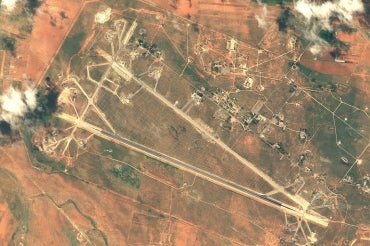With U.S. airstrike in Syria, potential for conflict with Russia is “immense,” says U of T political scientist

Published: April 7, 2017
The United States fired 59 Tomahawk missiles on Thursday at an air base in Syria.
The U.S. said the airstrike on the base focused on a target responsible for the chemical weapons attack earlier this week, in which more than 80 Syrians in a rebel-held area were killed.
The Russians, who were in the area of the U.S. airstrike, were given 90 minutes’ notice of the attack by the U.S. On Friday, the Kremlin denounced Trump's airstrike.
U of T News spoke with political scientist Ryan Hurl of U of T Scarborough about the strike and what this means for U.S.-Russia relations and global security.
 What do you believe is behind Trump’s airstrike, especially considering it was risking his relationship with Russia?
What do you believe is behind Trump’s airstrike, especially considering it was risking his relationship with Russia?
President Trump must believe that the risk of antagonizing Russia is less than the risk of inaction – in particular, allowing states to believe that chemical weapons can be used without consequence.
For the United States to establish “red lines” regarding the use of certain weapons, and to then do nothing when the line is crossed, does not do very much to advance the interests of the United States.
Perhaps the Trump administration is acting on the assumption that its various overtures to Russia – the notion that American interests and Russian interests can be reconciled sometimes – have purchased them some degree of goodwill?
What will this do to American relations with Russia?
The potential for conflict is immense, and this is by far the greatest concern raised by the intervention.
But it is too early to draw conclusions about what the consequences will be in terms of Russian-American relations – too early for me, at any rate.
Russia has said this is good news for terrorists – what will a push to remove Bashar al-Assad from power mean for stability in the region?
It is very difficult to perceive what “the best case scenario” would look like if Assad is removed.
On the other hand, it is very easy to imagine the likely scenario. There is no “government in waiting” ready to replace Assad. The rebel movements are composed of a variety of squabbling groups, many of them made up of radicals and jihadists.
Removing Assad will not alleviate the ethnic, religious and political grievances that divide Syrians. In other words, it is difficult to see how removing Assad would improve political stability in the region.



